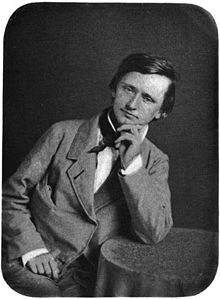Recently the News Letter had an article about Thomas Buchanan Read, an American poet and portrait painter, who was born in Chester County, Pennsylvania on 12 March 1822. It was an interesting article but omitted to mention that he was of Ulster-Scots ancestry.
His great-grandfather Rev Thomas Read DD was born in Chester County in March 1746 and was the son of Scotch-Irish immigrants from Ulster. He was educated at the Philadelphia Academy under Dr Francis Alison, a Presbyterian minister from Ulster, and in 1768 he was licensed as a Presbyterian minister.
Thomas Read was pastor of of the Presbyterian congregation in Drawyer's Creek in Delaware from 1768 to 1798, when he moved to the Second Presbyterian Church in Wilmington, Delaware. He remained there until 1817, when he resigned and thereafter he preached from time to time in the First Presbyterian Church in Wilmington, which was without a pastor. In 1796 Princeton College awarded him the degree of Doctor of Divinity.
During the American Revolution he was an earnest patriot and in 1776 he and some fifty others, his neighbours and members of his congregation, shouldered their muskets and marched to Philadelphia. However their assistance was unnecessary and they were able to return home. The following year George Washington sent for Read to provide information on the geography of the surrounding country prior to the Battle of Brandywine.
Dr Thomas Read had four sons and one of them, James Read, who was a school-teacher, married Hannah Buchanan and they were the grandparents of Thomas Buchanan Read.
Thomas B Read started work as a painter in Cincinnati in 1839 but in 1841 he moved to Boston and there his poetical talents developed, first finding expression in the columns of the Boston Courier. Read moved to Philadelphia in 1846 and his first volume of poetry was published in 1847. Among the portraits he painted were Abraham Lincoln, Henry Wadsworth Longfellow, Alfred Tennyson, Elizabeth Barrett Browning, Robert Browning and William Henry Harrison.
Read made several visits with his family to Europe but returned to America in 1861, at the start of the Civil War. He enrolled as a volunteer in the Union Army and served under General Lew Wallace, who was also of Scotch-Irish ancestry, but perhaps his most important support for the Union cause was through his patriotic poems and addresses.
After the war his health deteriorated and he spent the winter of 1871-72 in Rome but in the spring he set off for America, believing that he would die there. On board the steamer he developed pneumonia but managed to reach New York, where he died on 11 May 1872. He was buried in North Laurel Hill Cemetery in Philadelphia. Shortly before he died he wrote a letter in which he said:
I can look back upon all the poetry I have ever written, and find it contains no line breathing a doubt upon the blessed Trinity and the great Redemption of man. When I have written my verses I have been alone with my own soul and with God, and not only dared not lie, but the inspiration of the truth was to me so beautiful that no unworthy thought ever dared obtrude itself upon the page. This was entirely owing to the goodness of God, who saw what it was to be, and saved me from subsequent mortification and regret.
Most of the above is taken from History of Chester County, Pennsylvania, with genealogical and biographical sketches, volume 2 (1881), by John Smith Futhey and Gilbert Cope.

No comments:
Post a Comment
Note: only a member of this blog may post a comment.